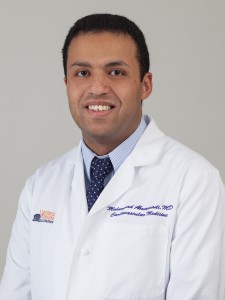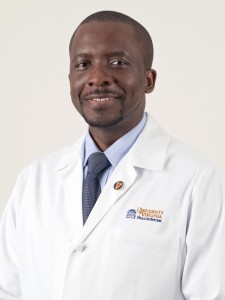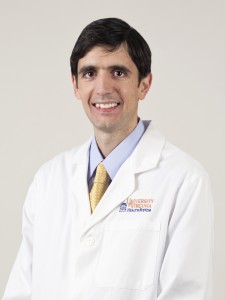There are two intersecting factors shaping the future of cardiology in the U.S. The first is the exponential growth of knowledge needed to practice effectively. Thanks to advances in research, there is more to know about the mechanisms of cardiovascular disease and the procedures used to treat it. Conveying this expanded body of knowledge to physicians is a challenge.
“The exponential growth in medical knowledge is compelling us to reconsider every aspect of medical education,” says UVA Cardiovascular Medicine Division Chief Brian Annex, MD. “We need people on our team who can systematically advance and evaluate the ways we provide education.” Helping to meet that need is Victor Soukoulis, MD, PhD, a specialist in noninvasive cardiovascular imaging who completed an Academy Fellowship in Medical Education at Harvard. His interest in new team-based and interactive approaches to medical education, as well as web-based learning for cardiology, will allow UVA to respond to this changing learning environment.
The second factor impacting the future of cardiology is an aging population. Medical centers must have added capacity to address the needs of patients with advanced heart failure. By adding Sula Mazimba, MD, MPH, and Mohammad Abuannadi, MBBS, to the faculty, UVA effectively doubles its capacity in the high-demand areas of advanced heart failure, mechanical support and cardiac transplantation, while complementing the work of its cardiac and vascular surgeons.
“Dr. Mazimba’s fellowship was at the University of Alabama-Birmingham, and Dr. Abuannadi’s was at the University of Michigan,” Annex says. “These are two of the best programs in advanced cardiac failure in the nation, and their graduates are in high demand. We were extremely fortunate to attract two such outstanding physicians.”
In Annex’s view, the arrival of these three new cardiologists represents an infusion of new perspectives and new knowledge. “The constant exchange of ideas and information is critical in elevating the care we offer our patients,” Annex says.
 Mohammad Abuannadi, MBBS
Mohammad Abuannadi, MBBS
Assistant Professor
Specialty: Cardiology, advanced heart failure, mechanical support, transplantation
Fellowship: University of Michigan
Residency/Fellowship: University of Missouri
Medical Degree: Jordan University of Science and Technology
Twenty years ago, the treatments that cardiologists could offer patients with advanced heart failure were limited. Today, with dramatic advances in mechanical circulatory support and transplantation, that has changed. Abuannadi was drawn to this specialty because of the opportunity to make a significant difference in the lives of people who are very sick. “I can help them live better lives as well as longer ones,” he says.
Abuannadi chose to come to UVA because the Medical Center has made a commitment to expanding its heart failure program and because of the outstanding team of cardiac and vascular surgeons it has assembled. “UVA has a great reputation,” he says. “It has an exciting vision for excellence in this area and is making the investment to support it.”
 Sula Mazimba, MD, MPH
Sula Mazimba, MD, MPH
Assistant Professor
Specialty: Advanced heart failure, mechanical support, transplantation, pulmonary hypertension
Fellowship: University of Alabama–Birmingham
Residency: Wright State/Kettering Medical Center
Medical Degree: University of Zambia
For Sula Mazimba, MD, MPH, coming to UVA was the logical next step in a career that combines interests in advanced heart failure and public health. The University’s expanding programs in assistive devices and transplantation were an incentive for someone who very much wants to care for patients he describes as being among “the sickest of the sick.” From a scientific perspective, he finds addressing the complex hemodynamics of heart failure to be a fascinating challenge, but he also relishes the opportunity to be part of a team where “the commitment to excellence in patient care is so much in evidence.”
In UVA’s master of public health program and its Center for Global Health, Mazimba also found a large and committed group of professionals with expertise in tracing the patterns and progression of disease around the world. Along with the Center’s director, Rebecca Dillingham, MD, MPH, he has already been exploring options for it to become more engaged in noncommunicable disease. “I see heart failure as both an individual and community issue,” he says. “At UVA, I can approach it from both perspectives.”
 Victor Soukoulis, MD, PhD
Victor Soukoulis, MD, PhD
Assistant Professor
Specialty: Noninvasive cardiovascular imaging, medical education
Fellowship: Brigham & Women’s Hospital
Residency: Northwestern University
Medical Degree: Vanderbilt University
According to Victor Soukoulis MD, PhD, “The amount of medical information has become so exponentially large that the old system — based on lecture and memorization — can’t keep up.” Soukoulis’ primary role within the Division of Cardiovascular Medicine is to make sure that medical students develop the skills they need to practice effectively in this information-rich environment. This means building educational programs that emphasize entrustable professional activities, the competencies that physicians need to function as independent physicians.
One of the ways he plans to do this is to make clerkships as collaborative and interactive as the medical classroom has become. “Right now, as medical students rotate through the cardiology clerkships, they tend to fade into the background, and the evaluations they receive at the end of the clerkship may arrive too late to prompt them to develop the skills they need,” he says. “We’re working on a system that can provide them with real-time feedback from faculty and patients so that they can identify areas where they need additional focus.”
Soukoulis chose UVA because he felt there was a real commitment to educational innovation among cardiology faculty. “As we explore new ideas, our challenge is to find those methods that make a measurable difference in the preparation we offer our students,” he says.